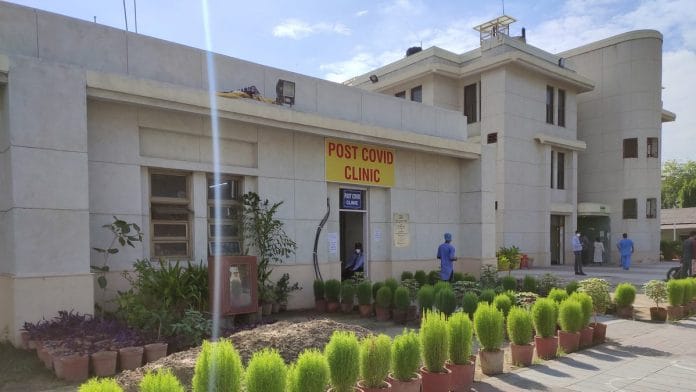New Delhi: The Delhi government has written to hospitals, advising them how to treat both Covid-19 and vector-borne diseases like dengue and malaria whose symptoms can be similar to the former.
The advisory was issued by the office of the Director General of Health Services Wednesday, a day when the national capital reported 3,686 new Covid-19 infections, according to the government health bulletin. This was the highest daily figure in 26 days, and it took the city’s total case count up to 3,40,436.
The Delhi government’s parameters are based on the Union Ministry of Health and Family Welfare’s 13 October guidelines, and highlight the ways to diagnose diseases with similar symptoms. The advisory pointed to the fact that the onset of winter ushers in seasonal diseases, and said physicians should follow a roadmap to prevent any adverse outcomes amid the pandemic.
While a senior Delhi health department official, who did not wish to be named, confirmed the development, DGHS Nutan Mundeja did not revert to calls or text messages.
Dr B.L. Sherwal, director of the Rajiv Gandhi Super Speciality Hospital, also confirmed the government’s advisory. “We have been receiving such instructions from the government and we need to be very careful,” he said, adding that the hospital was conducting more blood tests for patients with similar symptoms.
“Since we are a Covid hospital, if the person tests positive for the virus, we will treat him/her, but if he/she is negative and is diagnosed with dengue, we are referring those cases elsewhere,” Sherwal told ThePrint.
Also read: Dengue antibodies could provide immunity against Covid, Brazil study suggests
What hospitals should do
Covid treatment facilities have been advised to be ready to conduct the tests recommended by the Indian Council of Medical Research for Covid-19 and those suggested by the National Centre for Disease Control (NCDC) for seasonal diseases. The government has also listed out these recommended tests.
“Dengue fever and Covid-19 share many pathogenic and clinical features which might make it very difficult to differentiate the two infections,” says the circular, a copy of which was accessed by ThePrint, adding that the medical facilities should be prepared to manage severe dengue and Covid cases at the same time.
It also states that strengthening the primary health care system is key to managing dengue through its diagnosis.
Mild-to-moderate dengue and Covid-19 patients should be monitored closely, “preferably at a hospital as the disease might progress rapidly”.
All secondary and tertiary-level hospitals should be prepared to manage severe dengue and Covid cases.
“In order to reduce mortality, co-infection should be ruled out by doctors after proper diagnosis, so that specific treatment could begin,” the advisory states.
“Antibiotics should not be prescribed routinely unless there is clinical suspicion of a bacterial infection. For Covid-19 patients with severe disease, also collect blood cultures, ideally prior to initiation of antimicrobial therapy,” it adds.
It also directs physicians to administer prescribed dosage of oseltamivir — an antiviral medication — for the treatment of influenza patients. In case there is an outbreak of influenza in Delhi, oseltamivir should be given to all Covid-19 patients.
The Union health ministry’s guidelines state: “Seasonal epidemic-prone diseases may present as a febrile illness, with symptoms that mimic Covid-19. If there is a co-infection, then apart from febrile illness, there may be constellations of signs and symptoms that may lead to difficulty in diagnosis.”
Covid cases rise again
Wednesday’s health bulletin confirmed that Covid is still an immediate danger to the city’s residents. Besides recording 3,686 cases, the highest in 26 days as stated above, Delhi also saw 47 new fatalities due to Covid-19 on the day, taking the toll up to 6,128.
Over 3,000 cases have been reported in Delhi every day of the last week, barring Sunday when the number of tests conducted was lower.
The city conducted 16,629 RT-PCR tests Wednesday, the highest in a single day. RT-PCR tests are considered the gold standard for the detection of the novel coronavirus, but are less common than the less-accurate rapid antigen tests.
But the share of RT-PCR tests is now rising — they accounted for 28 per cent of the total 59,064 tests conducted in the past 24 hours.
The Delhi High Court had earlier questioned the government on why RT-PCR tests were not being performed to full capacity. The alternative, rapid antigen tests, are cheaper, easily deployable in clinics and dispensaries, and give results within 15 minutes, but they can give false negatives, or miss positive cases.
Also read: Severity, lethality, defence: How new coronavirus stacks up against seasonal influenza







Bug Repellent Clothing
The insect repellent market is now witnessing a new trend for anti-mosquito clothing. Anti-mosquito clothing is a personal protection technology wherein the fabric is treated with insecticide during its manufacturing. The garment itself is a physical barrier but the insecticide provides an additional repelling and knock-down effect, minimizing the potential of mosquito biting. The apparel proves to be more effective than other mosquito repellent products.
Clothing can be treated using repellents to prevent insects from contacting your skin with quick-acting insecticides of pyrethroid group such as permethrin. The compound does not repel the insects but lets them contact the fabric and irritates or kills them before they can feed. What makes the insect repellent clothing so preferable is that unlike skin application products, it reduces the chances of allergic reactions. These garments ensure limited contact with human skin and offer strong adherence to fabric fibres.
Permethrin is the commonly used insecticide for fabric impregnation, which produces both knock-down effect and repellent effect. The insecticide kills the mosquito by impairing the nervous system of the mosquito upon absorption. The insecticide has a low toxicity to human which makes it suitable for impregnation.